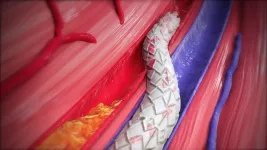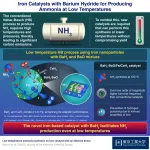(Press-News.org) More than 75% of patients facing amputation from the most severe form of peripheral artery disease were able to keep their limb after an innovative treatment as part of a multicenter study published in the New England Journal of Medicine.
The alternative to amputation, known as “limb salvage,” for patients with chronic limb-threatening ischemia (CLTI) came from the PROMISE II U.S. clinical trial assessing LimFlow technology and its use in performing transcatheter arterialization of the deep vein system.
The trial completed recently, and results were formally presented at the VIVA (Vascular InterVentional Advances) meeting in Las Vegas.
“This procedure is the only option for a subset of patients with severe vascular disease who are at risk for amputation of their limbs,” said the study’s co-principal investigator Daniel Clair, MD, professor and chair, Department of Vascular Surgery.
“Patients with long-standing diabetes and severe vascular disease in the foot itself often have no way to restore enough blood flow to the foot to heal wounds. In the past, a majority of these patients ended up losing their limbs,” he said.
The technique of arterialization of the veins was initially proposed over 100 years ago, but it was not until understanding that blood flow needed to be directed into the foot veins that limbs were able to be saved, Clair said.
An estimated 2 million Americans are living with CLTI. About one-third of amputees become depressed or anxious, and many experience “phantom pain” in the limb that is no longer there.
Nearly half of amputees from vascular disease will die within five years.
The PROMISE II U.S. trial studied 105 CLTI patients (43% Black, Hispanic or Latino) treated with the minimally invasive system, designed to bypass blocked arteries in the leg and restore blood flow into the foot through the veins.
All patients were facing amputation prior to the procedure and had nonhealing wounds on their feet, often called diabetic ulcers. Clair said amputation-free survival in the trial was 66% because some of the patients expired without an amputation.
Researchers found that 76% of patients in the study were able to keep their legs and had completely healed or healing wounds six months post-procedure. Patient pain was also significantly reduced. Freedom from all-cause mortality was 87% at six months.
“As these patients tend to be elderly and increasingly frail, the ability to do this through the skin offers the chance to provide this procedure with a minimally invasive approach, offering quicker recovery and lower risk for wound problems and less disability,” Clair said.
“Now the majority of these patients can have their limbs and their independence saved with this approach to further reduce the risk of amputation for patients with vascular disease,” he said.
END
New procedure helps patients avoid leg amputation
2023-03-30
ELSE PRESS RELEASES FROM THIS DATE:
Prototype taps into the sensing capabilities of any smartphone to screen for prediabetes
2023-03-30
According to the U.S. Centers for Disease Control, one out of every three adults in the United States has prediabetes, a condition marked by elevated blood sugar levels that could lead to the development of Type 2 diabetes. The good news is that, if detected early, prediabetes can be reversed through lifestyle changes such as improved diet and exercise. The bad news? Eight out of 10 Americans with prediabetes don’t know that they have it, putting them at increased risk of developing diabetes ...
Doctoral candidate creates technique to improve AI energy efficiency
2023-03-30
An engineering doctoral student is shedding light on the reliability of today’s modern-day artificial intelligence with an issue most do not think about: energy efficiency.
Noel Daniel Gundi, who will defend his dissertation later in the semester, was the lead collaborator on research addressing reliability and faults in artificial intelligence. The research paper will be presented and published at the Design Automation Conference in July. It focuses on the computer chip used for artificial intelligence software, such as Google’s search engines. When at low power, the chip ...
New ideas for biodiversity research: ecologist Jonathan Chase receives ERC Advanced Grant
2023-03-30
The European Research Council (ERC) announced that Professor Jonathan Chase will be awarded one of the prestigious ERC Advanced Grants. The scientist will receive almost 2.5 million euros over the next five years to fund his research project "MetaChange". With this project, he plans to develop new concepts, tools and analyses for a better understanding of biodiversity and its change. Chase has been conducting research and teaching at Martin Luther University Halle-Wittenberg (MLU) and the German Centre for Integrative Biodiversity Research (iDiv) Halle-Jena-Leipzig since 2014.
"Jonathan ...
Breaking the barrier: Low-temp ammonia synthesis with iron catalysts and barium hydride
2023-03-30
The Haber-Bosch (HB) process is one of the most important industrial chemical reactions. It combines nitrogen and hydrogen gases in the presence of an iron-based catalyst at high temperatures and pressures to produce ammonia fertilizer which helps provide food for over five billion people. Over the decades, researchers have tried to bring down the reaction temperature of the HB process to increase the ammonia yield while reducing energy consumption. To this end, they have recently developed new catalysts based on other transition metals, ...
Boosting the body’s anti-viral immune response may eliminate aging cells
2023-03-30
BOSTON – Aging, or senescent cells, which stop dividing but don’t die, can accumulate in the body over the years and fuel chronic inflammation that contributes to conditions such as cancer and degenerative disorders.
In mice, eliminating senescent cells from aging tissues can restore tissue balance and lead to an increased healthy lifespan. Now a team led by investigators at Massachusetts General Hospital (MGH), a founding member of Mass General Brigham (MGB), has found that the immune response to a virus that is ubiquitously present in human tissues ...
Revealing the pattern between frontal polymerization and natural convection
2023-03-30
A self-propagating chemical reaction can transform a liquid monomer into a solid polymer and the interaction between the propagating front and the reaction’s natural convection leads to patterns in the resulting solid polymeric material. New University of Illinois Urbana-Champaign work has shown how the coupling between natural convection and frontal polymerization leads to those observed patterns.
This research was led by a unique team of researchers- Materials Science and Engineering professor Nancy Sottos, Aerospace Engineering professor Philippe Geubelle, and Mechanical Science and Engineering ...
New mechanisms and therapeutic possibilities for heart failure uncovered by scientists at the Lewis Katz School of Medicine at Temple University and Johns Hopkins University
2023-03-30
(Philadelphia, PA) – Greater awareness and advances in treatment have greatly improved survival rates following heart attack. With more survivors, however, has come the challenge of managing long-term impacts on heart function, especially chronic heart failure, in which the heart gradually loses its ability to pump blood.
Mortality among individuals affected by chronic heart failure following a heart attack – referred to medically as myocardial infarction (MI) – is high. But, according to new research from a major collaborative effort led by scientists at the Lewis Katz School of Medicine at Temple University, more effective treatments may soon ...
How to achieve a functional cure for chronic hepatitis B
2023-03-30
Geneva, March 30, 2023 – More than half of patients who suffer from chronic hepatitis B have the e antigen (HBeAg)-negative form of the disease. Even after many years of antiviral treatment with nucleos(t)ide analogues (NUC), lasting immune control is almost never seen. According to the current state of knowledge, those affected therefore require lifelong therapy. In the world’s first randomized controlled multicenter study – led by Leipzig University’s Faculty of Medicine and in partnership with the Centre for Clinical Studies (ZKS) – researchers have shown that many HBeAg-negative patients ...
New, exhaustive study probes hidden history of horses in the American West
2023-03-30
A team of international researchers has dug into archaeological records, DNA evidence and Indigenous oral traditions to paint what might be the most exhaustive history of early horses in North America to date. The group’s findings show that these beasts of burden may have spread throughout the American West much faster and earlier than many European accounts have suggested.
The researchers, including several scientists from the University of Colorado Boulder, published their findings today in the journal Science.
To tell the stories of horses in the West, the team closely examined about two dozen sets of ...
Newly discovered trigger for major depression opens new possibilities for treatments
2023-03-30
A common amino acid, glycine, can deliver a “slow-down” signal to the brain, likely contributing to major depression, anxiety and other mood disorders in some people, scientists at the Wertheim UF Scripps Institute for Biomedical Innovation & Technology have found.
The discovery, outlined Thursday in the journal Science, improves understanding of the biological causes of major depression and could accelerate efforts to develop new, faster-acting medications for such hard-to-treat mood disorders, said neuroscientist Kirill Martemyanov, Ph.D., corresponding author of ...









